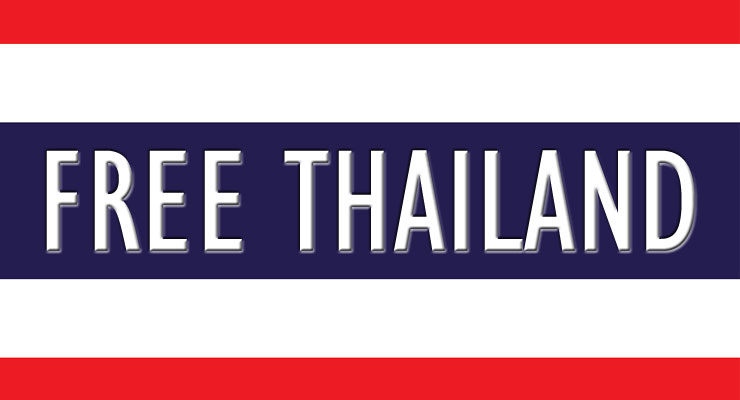 From VOA:
From VOA:
For over a year Thailand has been rocked with political unrest as youth-led demonstrators demand political reform and a reduction in powers for the Thai monarchy.
With criticism against the Thai monarchy forbidden and pressure mounting on Prime Minister Prayuth Chan-Ocha’s administration, including over its pandemic response, authorities have attempted to limit news.
Early on, authorities issued an emergency decree in October 2020 that banned publishing or broadcasting news and information that could incite “public fear.” And in July 2021 the government attempted to pass Regulation 29, which would have given it far-reaching powers to block content deemed a danger to public order.
Pravit Rojanaphruk, an award-winning journalist who works for the news website Khaosod English and who has advocated for greater media freedom, told VOA the attempts show that authorities want to “control the narrative.”
“I think the mentality is shifting towards the Chinese model, and that’s clear. They feel there’s a need to try and intervene, clamp down or restrict the free flow of news,” Rojanaphruk said. “I can see the directions where they’re heading seems to be sharing more ethos or mentality with that of the Chinese regime than Western countries.”
Media laws
Ultimately, the government’s attempt to pass Regulation 29 failed. Media groups and lawyers filed a complaint to the civil court, which later issued an injunction blocking the move.
If it had passed, the decree would have allowed authorities to censor online expression, investigate individuals deemed as instigating fear, and empowered the National Broadcasting and Telecommunication Commission to cut individuals’ internet access.
Thailand is already known for strict media laws, with those convicted of defaming the royal family under the lese-majeste legislation facing up to 15 years in prison.
At least 148 people have been charged under the law since protests began, with 62 cases related to online expression, according to the Thai Lawyers for Human Rights group, an organization that documents rights violations.
“The lese-majeste law has been such an obstacle for press freedom and freedom of expression in Thailand, a long-standing one. Now [we have] COVID-19, the government’s attempt, and the arrests of people who express themselves,” Rojanaphruk said.
The journalist said that media mostly are unwilling to write anything that could be seen as critical of the monarchy.
“Censorship and self-censorship have been the norm for the vast majority of the Thai press,” Rojanaphruk said. “They think the law does not impede their duty and work, and reporting critically about the monarchy, and unfortunately that is still the case.”
In its press freedom index, Reporters Without Borders (RSF) said that coverage of the protests showed the laws’ impact on self-censorship, with a key demand—reform of the monarchy—largely missing. Thailand ranks 137 out of 180 countries, where 1 is freest, on the media watchdog’s annual index.
Protest coverage
Rojanaphruk said the protest movement is now focusing less on monarchy reforms and more on mishandling of the pandemic and its impact on the economy.
The government has been slow to roll out its vaccine program, with around 40% of the 70 million population vaccinated, according to a Reuters tracker, and until recently, strict curfews were in place.
Since August, clashes between small groups of protesters and police have been a daily occurrence. Each evening, exchanges of fireworks and teargas transform sections of Bangkok into chaos.
Local media are reporting on events, but some journalists say they feel targeted by police.
In September, authorities arrested two journalists, including one who reports via Facebook, for allegedly violating curfew orders, according to local reports.
Kan Sangtong, an observer with Amnesty International and the Thai human rights organization iLaw, said he has seen police obstruct journalists during street demonstrations.
“Many times during the field the police try to block journalists when they try to capture protests,” he told VOA.
Santong said the relationship between the police and media worsened last year, after a water cannon was deployed when clashes first escalated.
Others including Rojanaphruk said that police are clamping down on those they deem are not “bona-fide media organizations,” such as reporters who stream events on Facebook.
“The attempt to draw the line and put a blueprint as to who is a ‘real’ journalist and not a real journalist. It is very anachronistic, out of sync. Anyone can become a so-called citizen journalist or a citizen reporter,” Rojanaphruk said.
Other journalists who spoke with VOA said that in recent weeks, police have been segregating reporters to check for press identification, leaving some independent reporters vulnerable because they don’t have the required documents.
But deputy police spokesman Colonel Kissana Phathanacharoen questioned the legitimacy of some reporters and said police have a duty to keep everyone safe.
“There are a lot of people who claim they are journalists, [but] they are protesters, and are just out there doing live streaming, targeting the police operations,” Phathanacharoen told VOA.
“We don’t allow bystanders to get in the enforcement area and intervene in our police job,” he said. “You have to be able to prove to the authorities you belong to some [media] organizations.”
The spokesperson said police are not trying to prevent people from doing their jobs and issue four warnings before taking action such as using a water cannon or rubber bullets.
Varuth Pongsapipatt, a journalist for online news magazine Plus Seven, said he has seen riot police change their mood toward the press depending on the event.
“The authorities, officers, always say via microphone, ‘Press, please photograph and film to record the evidence [to show] that [the] police didn’t do any violence’ and five minutes later they will change and say ‘Press, go away. If you are on the street we will arrest you,’” he told VOA.
The journalist is suing police after being hit by rubber bullets earlier this year.
The obstructions, coupled with attempts to further restrict independent reporting, could result in Thailand declining on media freedom rankings, journalist Rojanaphruk said.
Leave a Reply